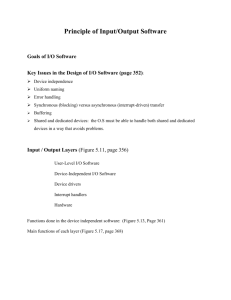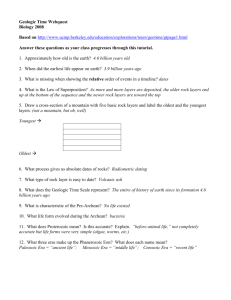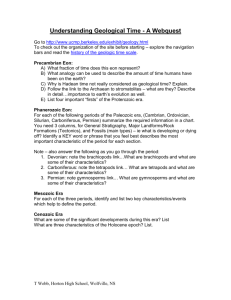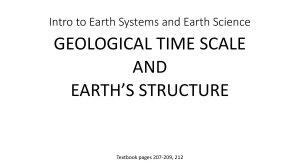GEOLOGICAL TIME SCALE
advertisement
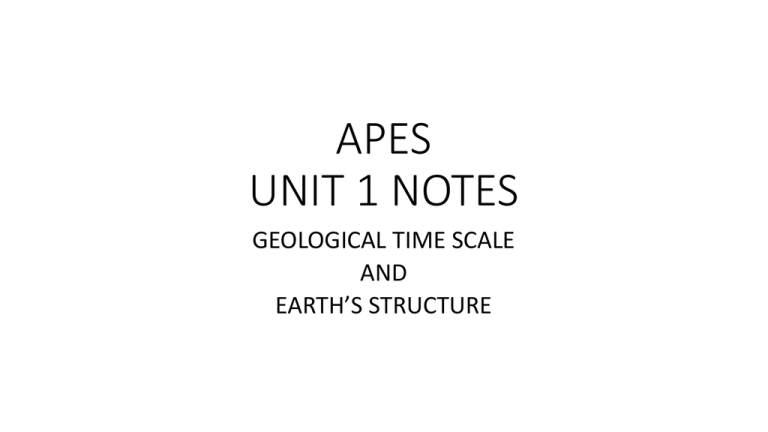
APES UNIT 1 NOTES GEOLOGICAL TIME SCALE AND EARTH’S STRUCTURE GEOLOGY The study of the nonliving parts of the Earth such as: rocks, soil, land features GEOLOGIST study Geology JAMES HUTTON “FATHER OF MODERN GEOLOGY” Figured out sedimentary rock gets compacted and compressed over time PRINCIPLE OF UNIFORMITARIANISM= changes in the Earth’s surface happened slowly. Example: gradual shifting across different continental land forms https://www.youtube.com/watch?v=lMfPSdrrjZI RELATIVE TIME MEASUREMENTS Measurements that give you the age of rock and soil layers by comparing them to layers above and below RELATIVE DATING PRINCIPLE OF SUPERPOSITION Dates an unknown sample to a certain time period when compared to samples of a known time period Top layers are youngest Bottom layers are oldest Strata are laid down in succession (layers are piled on top of each other over time) ABSOLUTE DATING Process of determining an approximate age of rocks by using radiometric methods https://www.youtube.com/watch?v=phZeE7Att_s GEOLOGICAL TIME SCALE *The history of the Earth is measured in Geological Time *It is organized according to major events *The largest unit of time is EON EON ERA PERIOD EPOCH IMPORTANT STAGES IN EARTH’S HISTORY *4.6 BILLION YEARS AGO (HADEAN EON) *3.5 BILLION YEARS AGO (ARCHEON EON/PRECAMBRIAN ERA) *2.5 BILLION YEARS AGO(PROTEROZOIC EON/PRECAMBRIAN ERA) *1.5 BILLION YEARS AGO(PROTEROZOIC EON/PRECAMBRIAN ERA) *550 MILLION YEARS AGO(PROTEROZOIC EON/ PALEOZOIC ERA/CAMBRIAN PERIOD) *450 MILLION YEARS AGO (PHANEROZOIC EON/PALEOZOIC ERA/ = = = = ORIGIN OF EARTH- NO LIFE FIRST PROKARYOTIC CELL- LIFE ATMOSPHERIC OXYGEN EXISTS FIRST EUKARYOTIC CELL = PRIMITIVE ALGAE/MARINE INVERTEBRATES = FIRST MARINE VERTEBRATES (FISH) ORDOVICIAN PERIOD) *400 MILLION YEARS AGO (PHANEROZOIC EON/ = FIRST LAND INVERTEBRATES & PLANTS *200 MILLION YEARS AGO (MESOZOIC ERA/TRIASSIC PERIOD) = FRIST BIRDS/ROCKY MOUNTAINS FORM *150 MILLION YEARS AGO (MESOZOIC ERA/JURASSIC PERIOD) = AGE OF DINOSAURS *65 MILLION YEARS AGO(CENOZOIC ERA/TERTIARY PALEOGENE PERIOD)=EXTINCTION OF DINOSAURS PALEOZOIC ERA/SILURIAN PERIOD) PALEOCENE EPOCH) • 2 MILLION YEARS AGO(CENOZOIC ERA/QUATERNARY PERIOD) • PLEISTOCENE EPOCH) =FIRST MAN/MAMMALS/INSECTS/FLOWERS Earth and our Solar System 3rd • _________ planet from the Sun life *only planet that can support _______________ elliptical *orbits the Sun in an ____________ pattern/shape 365 *takes ________ days to complete one orbit 24 *takes _____ hours to complete one rotation 4.6 *was formed _______ billion years ago EARTH’S INTERACTIVE COMPONENTS GEOSPHERE = makes up the Earth’s interior (rock) ATMOSPHERE = makes up the gases surrounding Earth (air) HYDROSPHERE= makes up the areas of water BIOSPHERE = makes up all the living things within the other parts GEOSPHERE EARTH IS AN INTEGRATED SYSTEM OF 4 INTERACTING COMPONENTS HOW EARTH FORMED - CAME FROM COSMIC DUST IN THE SOLAR SYSTEM (BIG BANG THEORY) ALL THE ELEMENTS FOUND ON EARTH ARE AS OLD AS EARTH EARLY EARTH WAS A HOT, MOLTEN SPHERE AS MOLTEN MATERIAL COOLED, THE ELEMENTS SEPARATED INTO LAYERS BASED ON MASS (HEAVY IRON TOWARDS THE CENTER) https://www.youtube.com/watc h?v=BBwqendK8zc EARTH LAYERS BECAUSE EARTH’S ELEMENTS SETTLED INTO PLACE BASED ON MASS…… EARTH IS DIVIDED INTO LAYERS 2 GROUPS OF LAYERS: COMPOSITIONAL LAYERS & PHYSICAL LAYERS KNOWLEDGE OF EARTH’S LAYERS *SEISMIC WAVES ANALYSIS *LAVA ANALYSIS *METERITE COMPOSITION COMPOSITIONAL LAYERS OF EARTH CRUST = thinnest, outermost layer, solid , brittle, coolest layer, mostly oxygen MANTLE = medium density, has magma that circulates, mostly iron, magnesium, aluminum CORE = innermost layer, greatest density, hottest, mostly iron and nickel PHYSICAL LAYERS OF EARTH 1. LITHOSPHERE = outer layer, includes crust and uppermost mantle, divided into tectonic plates 2. ASTHENOSPHERE = middle part of mantle, flexible, rock flows slowly 3. MESOPHERE = lower part of mantle 4. OUTER CORE = outer part of core, dense liquid nickel and iron 5. INNER CORE = inner most part of core, dense solid nickel and iron due to pressure, over 4000 ° C Comparison of the Compositional and Physical Layers Physical Layers
